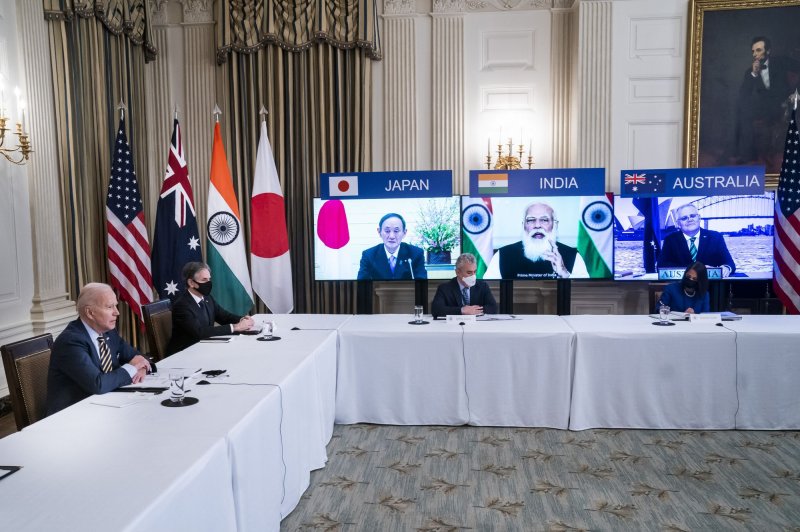1 of 4 | U.S. President Joe Biden (L) meets virtually with the Quad, Prime Minister Narendra Modi of India, Prime Minister Scott Morrison of Australia, and Prime Minister Yoshihide Suga of Japan, from the White House on Friday. Photo by Jim Lo Scalzo/UPI |
License Photo
March 12 (UPI) -- An article in Chinese state media is warning South Korea against joining the United States-led Quadrilateral Security Dialogue, or Quad, ahead of the group's first meeting on Friday.
Cheng Xiaohe of the School of International Studies at Renmin University said in the Global Times article South Korea should not give up its "strategic ambiguity" toward the Quad partnership that includes Japan, India, and Australia.
"Joining the Quad will inevitably damage the just restored strategic mutual trust between China and South Korea," Cheng said.
"China's State Councilor and Foreign Minister Wang Yi visited South Korea in November 2020 and the two sides reached 10 consensuses including launching the China-South Korea "2+2" dialogue on diplomacy and security.
"These are all hard-won results. If Seoul joins the Quad, it will destroy such mutual trust."
Cheng also wrote South Korean attitudes toward the Quad is changing, pointing out the country has agreed to approach potential membership in a "transparent, open and inclusive" manner.
"South Korea's attitude toward the Quad is obviously more positive than before," Cheng said. "Seoul has changed its attitude because it may also enjoy balance between Beijing and Washington."
Seoul and Beijing have disagreed on a number of issues. In 2016, South Korea's decision to deploy the U.S. missile defense system THAAD led to Chinese economic retaliation. Talks on cross-boundary pollution, fine-dust particles that seasonally travel from China to Korea, have also stalled.
South Korea depends substantially on China for trade, but joining the Quad could mean taking part in a robust supply chain.
The Nikkei reported Friday the Quad summit is expected to address securing rare earths. The four countries are planning to strengthen their network for rare earths procurement so their economies can be less dependent on China for resources.
China has in the past politicized trade with partners. In 2010, China stopped export rare earths to Japan after the two countries disputed over the Senkaku Islands. Prices of some rare earths rose nine-fold, according to the report.















